Recent Immigration Articles
Why a call for amnesty for immigrants illegally in the UK is counter-productive for them
by Tim Finch
The news that US legislators have moved one step close to introducing a large-scale amnesty for immigrants living illegally there has inevitably led to calls, most strikingly from a leading Tory backbencher, for something similar in the UK.
A few years ago I would have supported such calls, and indeed marched many times under the Strangers into Citizens banner. But while leading a major piece of IPPR research on irregular immigration a couple of years ago I changed my mind.
The reason I did is simple – there’s a quicker and more realistic way of achieving the same result. It’s less politically contentious, flexible and responsive, avoids stirring up public angst and delivers results. Moreover, it is in effect existing government policy and practice.
What I’m talking about is case by case (very occasionally group by group) regularisation in instances where it is clear that return or removal is not feasible or safe. Without any fanfare this approach has been pursued with reasonable success for a number of years, regularising many thousands, without derailing our managed migration system.
To take just one example: I’ve been associated with an organisation called the Zimbabwe Association for a number of years. It used to be the case that most of our members were failed asylum seekers fighting deportation or detention. Some were no doubt wrongly refused protection; but there will have been others who had a weak case for asylum.
Now, though, pretty much every one – hundreds in all – have been granted some kind of legal status in the UK. Do you remember an amnesty for Zimbabwean asylum seekers being announced? Quite. But by other means the same end has been achieved. The process has been opaque, convoluted, inconsistent, imperfect in many ways, but the result has been that many Zimbabweans, fearful of returning to a country still ruled by Mugabe, have been allowed to stay in the UK and to start building new lives.
By contrast, if they’d been relying on a large scale, pre-announced amnesty or the introduction of a comprehensive ‘pathway to citizenship’ (which in fact is what the Senate approved in the US), they would still be trapped in the limbo of irregularity.
Of course open, upfront regularisation schemes, which attach clear conditions to achieving citizenship and which can distinguish between people who have fallen foul of the system and those who’ve set out to evade it, are intrinsically preferable. They are more transparent and democratically accountable. If conditions would allow , a scheme of this sort would be the best response to reducing the UK’s substantial population of irregular migrants for the benefit of everyone.
But there is no prospect of commanding sufficient political support to introduce such a system in the foreseeable future. (Nick Clegg has dropped the LD regularisation project too). The political argument is being won in the US in a very different demographic and political context. If it is a ‘proper’ regularisation scheme or nothing in the UK, we will end up with nothing.
More than that, even calling for ‘big bang’ solutions is counter productive as it actually narrows the political space for taking a pragmatic and reasonably humane approach to reducing irregularity.
So although it is not very noble and principled perhaps, the better course is to turn down the heat on the government to make a big gesture and instead to leave it to pursue (and perhaps over time extend) a low-key approach that, for all its faults, is helping to resolve a very thorny problem. In doing so it is improving the lives of both thousands of very vulnerable people and tacking a social issue which blights the communities in which they live.
—
Tim Finch is a former head of migration at IPPR and author of the forthcoming novel about refugees The House of Journalists
Trenton Oldfield’s family aren’t the only victims of the vindictive British state
Public opinion appears to be that Trenton Oldfield, the protester who disrupted last year’s boat race, is a bit of a dick. I’m not that bothered – the race is a fix anyway, the same two teams get into the final every year.
In the very week that his British wife is expecting their first child Oldfield has been told that, after ten years, his presence is no longer welcome in this country. Theresa May’s decision to seek to have him transported to Australia for his crimes (on top of the two months he’s already served inside) goes against all natural justice but, more importantly, seeks to split up his family to make some cheap political point.
The collateral damage of May’s callous punishment is his British wife and soon to be born child, a child whose right to a father she seems unwilling to consider.
The terrible truth though is that Oldfield’s family are not alone. For many British born people it is harder to settle with their spouse and children in this country than it is almost anywhere else in the world.
It is even easier for EU citizens to settle here with non-EU spouses than it is for a UK citizen to be reunited with their own children if they were born outside the EU.
Imagine only being able to see your mother on Skype.
Imagine being separated from your own children because they were born abroad by a non-EU citizen.
Imagine having an elderly relative who desperately needs your support, but being unable to look after them because they come from outside the EU, or being separated in your old age from your only remaining family members because of where you were born.
That’s hundreds of broken hearts before we even consider the cases of refugees and asylum seekers where we split 200 children from their detained or deported parents.
None of this is because they have committed a crime (even a fairly trivial one, as in Oldfield’s case), but purely because they had the audacity to fall in love with someone with the wrong colour passport. The toxic debate around immigration bears little relationship to the reality.
If you are wealthy life is, naturally, easier. If you seek to be reunited with your family you need to demonstrate, among other things, that you are earning at least £22,400 with a further £2,400 for each additional child – a burden even harder to meet if you live in a poorer part of the country or belong to a group of people who earn less than the average… like women.
If you cannot meet the financial and other tests then your family will be one more victim of this government’s desperation to drive down the immigration figures in any way they can think of. You don’t have to disturb the rich at play to have your family torn apart.
British citizens might feel it is their natural right to have their children live with them, no matter where they were born, but this is not always the case.
The first anniversary of the government’s decision to change the family immigration rules (Tuesday 9 July 2013) please help keep up the pressure.
Andy Coulson, David Cameron and Immigration Frankenstein Monster
Andy Coulson apparently has some advice for Cameron on how to deal with the rise of UKIP and public about immigration:
I’m not convinced that’s where the public are. Broadly speaking, they care less about where someone is from and more about the basic principles of fairness and in particular the impact of immigration on pubic services. And in those areas – especially around free housing and benefits – good policies are in place. The trick is to find ways of communicating them to the public more frequently.
Put aside for a moment that the Tories think they have good policies in place. What we’re seeing is the slow realisation on the Right that they’ve created an Immigration Frankenstein Monster – one that could consume them too.
James Kirkup in the Telegraph adds himself:
In other words, voters aren’t so much concerned about immigration as its consequences. That’s a point I’ve heard a few Tories — ministers included — make in private, but few, precious few, will say so publicly. I wonder if Mr Coulson’s candour will encourage others to speak up?
Others won’t speak out because the big elephant in the room is the right-wing press.
The Immigration Frankenstein Monster theory works like this:
While in opposition, the Conservatives constantly stoked up paranoia and anger about immigration by making absurd and baseless claims. The tabloid press wasn’t just a willing partner – they were pleased that senior Tories fed the conspiracy lunacy.
But with the anger stoked up, Tories are having a hard time keeping a lid on it while in power. They know it undermines growth and deprives UK of foreign student cash, but they need to please their base. Despite increasingly draconian speeches and measures, voters aren’t convinced and think the Tories can’t deliver on promises.
So some of them are moving back to Labour on the issue in disappointment.
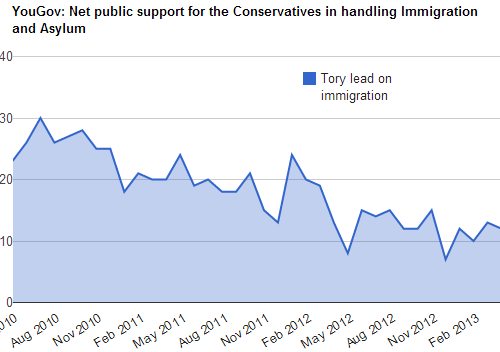
But the voters most obsessed with immigration are moving to UKIP, which presents Cameron with a dilemma. If he ignores them then UKIP remains powerful and he gets lambasted in the right-wing press. If he reaches out to them he will lose more moderate voters but may not actually tempt many UKIP voters back (since immigration is genuinely difficult to control / predict).
Besides, there is no easy way for the Tories to ‘communicate’ they have immigration under control, as Coulson suggests.
1) They have already tried very hard with major speeches and policy announcements. You can only do this for so long before the public tunes out.
2) Tabloid coverage of immigration maintains the lunacy of the past and gives the impression that the Tories don’t have it under control. Therefore voters who are most angry about it aren’t even willing to come back.
Plus, the Tory leadership cannot credibly challenge a press mentality on immigration that they fostered in opposition.
The Frankenstein Monster of Immigration, which was once an electoral asset, is turning into a big liability. Ed Miliband has done an admirable job of avoiding the same trap so far and he should stick to it. But Cameron is in a mess of his own making – a mess that the right-wing press will only add to.
Why is the government intent on breaking up these families?
by Sarah Campbell
Last month, The Telegraph enthusiastically publicised a new bid to ‘tackle the growing number of offenders using the “right to family life” laws to avoid deportation.’
Theresa May has now promised to introduce legislation to achieve the same end.
However, a report published last week by my organisation, Bail for Immigration Detainees, shows that the separation of families by immigration control can have extremely serious consequences for children’s welfare, and that single parents can be separated from their children after committing a relatively minor offence, or no offence at all.
We looked at the cases of 111 parents who were separated from 200 children. Many, but by no means all, of these parents had committed offences and served sentences. Parents were held in immigration detention without time limit, for an average of 270 days, and in some cases for over two years. The decision to detain them was not made by a judge, but by an immigration officer. In 92 out of 111 cases, parents were eventually released, their detention having served no purpose. 15 parents were removed or deported without their children.
Children were left without their detained or deported parent, sometimes in frankly appalling situations. In 85 out of 200 cases, children didn’t have another parent to take care of them and were in care. Many of the children in the study were born and grew up in the UK, and were British Citizens.
One girl was seven when her mother was detained for 173 days. One of her foster carers said:
At times Hana would sit by herself and break down and cry.
When you asked her what is the matter, she say “when is my Mum coming I want to go home with her.”
In one case, the Home Office deported a single father leaving his nine and 12 year old sons with his ex-girlfriend. They did not do anything to find out if the children’s care arrangement was safe.
12 of the 15 parents in this study who were removed or deported without their children had been convicted of non-violent offences including possessing false documents, and one parent was not convicted of any offence. In some cases, where parents did not have the right to work or claim benefits, they committed offences to buy food for themselves and their children.
It is difficult to imagine any other situation where children in the UK could be separated from their parent and have such scant attention paid to their welfare.
—-
Sarah Campbell is Research and Policy Manager at Bail for Immigration Detainees
The ‘White Flight’ debate shows how little we understand integration in the UK

by Jon Yates
The debate about the 600,000 white Brits who left London in the last decade shows how broken our thinking on integration is. The debate has been dominated by right-wing commentators in despair and left-wing commentators in denial. It is time for some new thinking.
The right-wing commentators have been predictable. For them, this ‘white flight’ is proof that multiculturalism is a terrible idea, immigration is all bad and the only answer is to close the borders. Even for someone who accepts the analysis, this is idealist nonsense.
Reducing immigration will never stop this country being diverse or becoming more so; my daughter is 3, a third of her peers are non-white. We are a multi-racial country – we need to deal with it, not deny it.
The left-wing comment is even more dispiriting. Commentators have competed to explain the exodus away. They tell us this has nothing to do with ethnicity. That it’s a story of ‘white families made good’: they’ve got some money and they’re heading to the seaside.
This makes sense – if you ignore all facts. How can a phenomenon that only applies to white people moving more white areas possibly be not about ethnicity.
It is time for those who care about living in a diverse, united country to speak up. For too long we have allowed our voices to be dominated by a right-wing that has nothing but a counsel of despair and a left that has no eyes to see what is happening. We need to start by admitting four self-evident truths.
One: We have a segregation problem. The OECD judges our schools to be amongst the most segregated. Our most ethnically diverse communities report the lowest levels of trust in others. And 600,000 people have just left London for a less diverse area. If you care about integration, let’s admit none of this is good news.
Two: It is about far more than ethnicity. It is also about the generational and income divisions that mark our country.
We can see this in an education system that places half the children who can’t afford lunch in just 20% of schools, a social care system that corrals the elderly together or isolates them at home, a lack of affordable housing that locates rich and poor in separate enclaves.
Three: It is a serious problem. Segregated societies are weak societies. Individuals have lower levels of well-being, communities have lower levels of trust and economies have less effective labour markets.
Four: The solution is integration. Activities that bond people together across boundaries are the key – not immigration policy. The National Citizen Service is a great example of how this can be done – through this, charities like my own have connected thousands of people across income and ethnicity and generational lines, built trust and helped to integrated communities.
Our debate should be about how we connect people together. It should be about building institutions where people will meet. It should be about how we transform our public services so people connect. It should be about how we all find ways to form friendships across boundaries.
We have had enough of despair and denial. It is time for action.
—
Jon Yates is the Co-founder and Strategy Director of The Challenge Network, the national charity for integration that connects 15,000 people a year from all income brackets, ethnicities and generations. The Challenge Network also blogs here.
Why changing minds on immigration is a lot harder than it sounds
“Most of what we’ve been saying about immigration for the last 40 years has backfired, and not worked for us,” said our American host quite bluntly. We were sitting around a table where the new offices of British Future would later be.
A group of Americans campaigners had come over to explain why, despite millions of dollars worth of lobbying, their debate on immigration remained negative and unfruitful. Our quest was to learn how we could avoid making the same mistakes, though it quickly became obvious we were in fact making the same mistakes as them.
There were three common responses to discussions on immigration that didn’t really work, our hosts said. In some cases they actually made people more resentful of immigrants and made the situation worse.
1) When we automatically brand people who want to talk about immigration as ‘racist’.
This response didn’t just fail to convince people, but drove up resentment and therefore led to more anger against immigrants. No doubt some people who oppose immigration are racist but there’s a spectrum here and some knee-jerk reactions are very counter-productive.
2) Telling people they don’t know the facts.
That the public is woefully uninformed on immigration is simply a fact. But there are two problems with this approach: first, people easily forget statistics that are quoted at them. They are more likely to remember narratives and stories (that the tabloid press use effectively). Secondly, the implication is that people are stupid. And when you call someone stupid they become less likely to want to listen.
3) We say immigration benefits us all economically, overall.
The overall impact of immigration may be positive but it won’t be uniform – some will see a positive effect and others negative. It goes without saying that those negatively affected (mostly poorer unskilled workers) will effectively hear us saying they should suck it up because the overall impact is positive.
There will be caveats for all these points above, but what unites everyone on this list above (with many on the left) is that no one likes their beliefs being challenged. If presented with evidence that proves them wrong, people make excuses. Or they reach for explanations that will justify their views. This is common human behaviour.
This is also why we keep losing the debate on immigration – we think people are misinformed, need to be taught facts and should not be listened to. That just makes them want to ignore us.
Why doesn’t Labour change the narrative?
This is the question almost every leftie asks. But probe it further and it quickly falls apart, because it is much easier said than done.
Labour is an opposition party which already struggles to get attention. Even if Ed Miliband said everything that lefties wanted, the media would distort it and re-interpret it for their audiences. And how many times would he have to say it before it got through to people?
Furthermore, people hostile to immigration would just ignore the speech and explain away the facts. This is how people react. This is how the world works. Just making a speech on immigration facts, even repeatedly, just wouldn’t do much to change the narrative.
I’m not saying Labour should pander and I’m not saying Labour should bring back the odious Phil Woolas and triangulate. I’m just pointing out that there are practical limitations to how much Labour can do.
So what is Labour doing then?
Ed Miliband understands that New Labour triangulation won’t work any more. His view has always been that immigration needs to be re-framed as an economic issue (‘a class issue’ – he called it), to help poorer workers at the bottom. He has thus far resolutely stuck to that view.
But you simply cannot take the public with you unless they trust you and think you understand their concerns. This is also basic psychology. So, first, Miliband has to gain their trust with a bit of humility and apologies. Once enough people think he’s trying to solve a difficult issue, only then will they start listening to his solutions.
But there’s another question too – what can left organisations do from the outside to change the debate? As the guys from America pointed out even this has been counter-productive in many ways. This should be the topic of another article.
In the meantime, have heart. Immigration has become a less poisoned debate in America recently only because minorities flexed their muscles and got President Obama elected twice. Though they are a smaller proportion of the British population here cannot exercise the same power, several key Tory commentators (esp. Lord Ashcroft) have noted that Tory hostility to immigration did cost them votes too.
We are a long way away from the days when Tories campaigned on immigration by saying ‘If you want a nigger for a neighbour, vote Labour‘. There is plenty of reason to be positive about the future.
Ed Miliband: ‘We didn’t get immigration right’
The Labour party is to air a party political broadcast (above) tonight dedicated solely to tackling the thorny issue of immigration.
The PPB will precede a speech tomorrow by the shadow home secetary Yvette Cooper, who will give a speech with more specifics on what a Labour party would go on immigration if in government.
Miliband will talk about how Britain’s diversity is a source of our great strength as a country, but that migration needs to work for all and not just for some.
In the broadcast, Ed Miliband will say:
- Labour were wrong in the past to dismiss people’s concerns about immigration;
- Low-skill migration is too high and we need to bring it down;
- One Nation Labour would make English-language teaching a priority.
In the broadcast, Ed Miliband says:
I’m going to tell people what I believe. And I believe that diversity is good for Britain. But it’s got to be made to work for all and not just for some. And that means everybody taking responsibility, everybody playing their part and contributing to the country. That is what One Nation is all about, and that’s the Britain I want to build.
The Party Political Broadcast will air on Wednesday night in England only, on BBC2 (17:55), ITV1 (18:25) and BBC1 (18:55).
UKIP wins the xenophobes: breaking down the Eastleigh result
You’d need a heart of stone not to laugh at the Eastleigh result. The coalition parties viciously tore strips off each other in the campaign (for a party normally opposed to employee protection laws, the Conservatives are remarkably and creditably concerned about workplace sexual harassment all of a sudden).
The biggest winner, despite only nabbing second place, was a party resembling a mad scientist’s chimera of the Tea Party and the Five Star Movement. The Tories were an dismal failure. And Milibandian Labour continued its trend of doing absolutely nothing exceptional by doing absolutely nothing exceptional.
However, it would be deeply unwise to take the raw numbers from Eastleigh and conclude that David Cameron is buggered, that the Lib Dem vote will hold up at the next election, that anyone really cares very much about Europe, that the Tories need to tack to the right in general, or that Labour can’t win in the South. How do we know all this? Weirdly, thanks to renowned philanthropist and psephologist Lord Ashcroft.
Four quick thoughts on British hostility towards immigration
Sunny draws attention to the "awful" fact that the public are overwhelmingly hostile (pdf) to immigration.
This raises the question: what if anything can be done to change this?
One possibility is to appeal not merely to the facts, but to the evidence of people's own eyes.
A poll (pdf) by Ipsos Mori has found that although 76% of people think immigration is a big problem in Britain, only 18% think it a big problem in their own area, and twice as many say it is not a problem at all.
However, several things make me fear that an evidence-based approach won't suffice to change people's minds:
» Hostility to immigration does not come merely from the minority who lose out in the labour market. People from higher social classes and the retired are as opposed to immigration as others. And even in the 60s, when we had as full employment as we're likely to get, there was widespread anti-immigration feeling. This suggests we can't rely upon improving labour market conditions to improve attitudes to immigration.
» There's little hope of attitudes changing as older "bigots" die off. The Yougov poll found that 68% of 18-24 year-olds support the Tories' immigration cap.
» Antipathy to immigration has been pretty stable (in terms of polling if not the violence of its expression) since at least the 1960s. This suggests there are deep long-lasting motives for it; I'd call these cognitive biases such as the status quo and ingroup biases.
» There's an echo mechanism which helps stabilize opinion at a hostile level. Politicians and the media, knowing the public are opposed to immigration, tell them what they want to hear and – a few bromides aside – don't challenge their opinion; one of the many appalling features of "Duffygate" was Gordon Brown's abject failure to challenge Mrs Duffy's hostility to immigration. (The BBC is also guilty here: "impartial" debates about immigration often seem to consist of the two main parties arguing about how to control it.)
All this makes me ambivalent about "calls for a debate" about immigration. Part of me thinks: bring it on – let's talk about the facts. But another part of me thinks that rightists just want to raise the salience of an issue on which public opinion is on their side.
There is, though, a deeper issue here. The fact that public opinion is hugely and stably opposed to immigration suggests that there is a tension between liberty – immigration is an issue of freedom – and democracy.
The awful state of public opinion on immigration
YouGov did some polling for the Sunday Times on the issue of immigration.
Here is what they found.
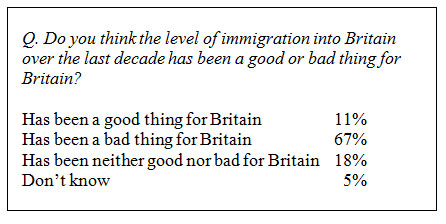
.
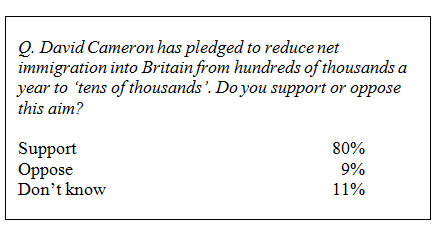
.
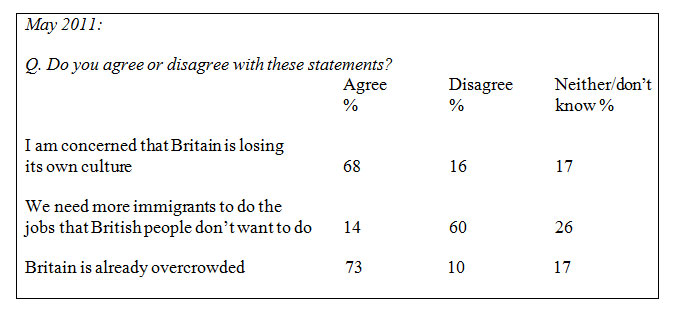
(click to expand)
.
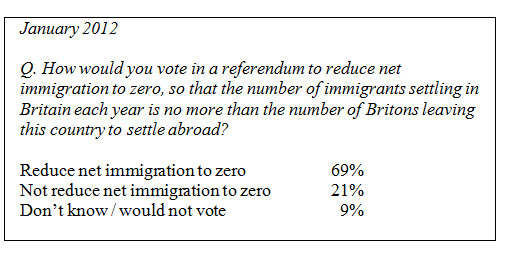
(click to expand)
The full commentary on these polls by YouGov is here.
NEWS ARTICLES ARCHIVE



















